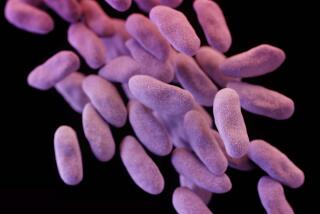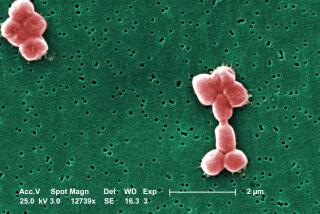Scientists Learn How TB Resists Common Drug
- Share via
NEW YORK — In a discovery that could lead to faster diagnosis and better treatment of tuberculosis, scientists have found how some TB bacteria become resistant to the most widely used drug, an international research team reported Wednesday.
The research shows that Mycobacterium tuberculosis can get rid of the gene that makes it vulnerable to the antibiotic isoniazid. That may help scientists develop a quick test to tell which patients are infected with drug-resistant tuberculosis, a key step in controlling its spread.
This form of the disease is emerging as a potentially disastrous public health problem. In the United States, it is especially common--and deadly--in people infected with HIV, the human immunodeficiency virus that causes AIDS.
In addition, the discovery “is very important because it is the first understanding of how any of these drugs work against tuberculosis,” said Dr. Barry B. Bloom at the Howard Hughes Medical Institute of the Albert Einstein College of Medicine in the Bronx.
The new findings, published in the journal Nature, were reported by Ying Zhang, Bryan Allen and Douglas Young at Hammersmith Hospital in London, in cooperation with Beate Heym and Stewart Cole at the Pasteur Institute in Paris.






